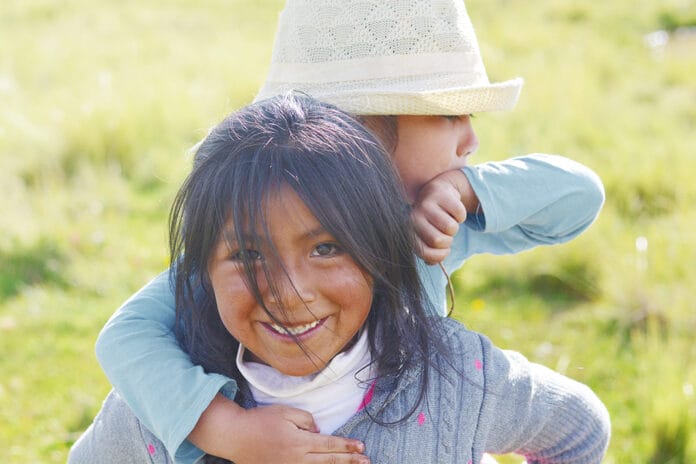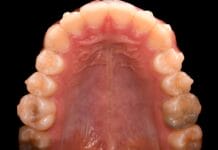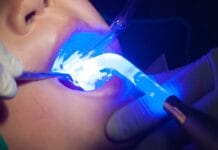Although largely preventable, tooth decay remains a major oral health problem. When tooth decay occurs in children before the age of six, it is referred to as early childhood caries (ECC).1 American Indian and Alaska Native (AIAN) children have a higher rate of ECC compared to other populations in the United States.1,2 A study by Phipps et al. found more than half of AIAN children between the ages of 1-5 years have experienced tooth decay.1
When children are this young, it is imperative to look at the ECC risk-related behaviors of their caregivers. Some of these behaviors include giving a child a bottle with something other than water before they go to sleep and using sweet snacks as rewards.
Blue et al. Study Summary
A recent randomized, controlled pilot study by Blue et al. investigated the effect of motivational interviewing (MI) on oral self-care behaviors of AIAN caregivers and if MI promoted positive behavior change in the caregivers’ ECC risk-related behaviors.2 The study found MI had a minimal effect on reducing parental risk-related behaviors for ECC in a health clinic in Minnesota that serves an AIAN community.2
However, it is important to note one can draw a precise and accurate conclusion only with an appropriate sample size. A smaller sample will give a result that may not be sufficiently powered to detect a difference between the groups.
Forty-four participants were initially enrolled in the study, but only 24 participants completed all four visits and were included in the data analysis.2 All the participants were predominantly AIAN and from low socioeconomic backgrounds.2 Although not statistically significant, the AIAN caregivers in this study did show improvement in daily brushing frequency for a notable significant clinical finding and showed a level of positive behavior change.
Results demonstrated knowledge scores of the AIAN caregivers did increase but did not result in behavior change.2 This finding highlights how increased knowledge does not automatically result in behavior change and raises questions about the impact of social determinants on patient behavior, suggesting the underlying beliefs and perceptions about oral health in the AIAN population may not be fully understood.2,3
In addition, the study revealed how there is limited ability to test upstream variables within the AIAN population, such as social disadvantages, risk exposure, and social inequities, which may contribute to poor health outcomes.1,2 These variables must be recognized by dental hygienists in order to optimally care for patients from low socioeconomic backgrounds.
Using Motivational Interviewing to Change Patient Behaviors
The profession of dental hygiene is rooted in disease prevention. Dental hygienists are uniquely educated in behavior change theory and counseling strategies aimed at preventing oral diseases.
One patient-centered counseling approach, MI, has been shown to be effective in changing oral health behaviors.4,5 Motivational interviewing is defined as “a collaborative, person-centered form of guiding to elicit and strengthen motivation to change.”6 Dental hygienists demonstrate the guiding principles of MI when they communicate with patients using open-ended questions, affirmations, reflective listening, change talk, and summaries.6,7
In addition to the Blue et al. study, research on using MI to decrease the incidence of ECC has shown MI to be effective in changing oral health behaviors related to nutritional choices, oral hygiene habits, and restorative treatment decisions by caregivers, resulting in a decrease in dental caries.8-11 This further provides support for dental hygienists to use MI in the clinical setting to promote positive behavior change in their patients. The Blue et al. research provided valuable insight on the complex nature of achieving positive behavior change in patient populations affected by upstream variables.2 Therefore, the impact social determinants have on behavior change requires further investigation.
Now Check Out the Self-Study, Peer-Reviewed CE Courses from Today’s RDH!
Listen to the Today’s RDH Dental Hygiene Podcast Below:
References
- Phipps, K.R., Ricks, R.L. The oral health of American Indian and Alaska Native children aged 1–5 years: results of the 2014 IHS Oral Health Survey. Indian Health Service data brief; 2015. Retrieved from https://www.ihs.gov/doh/documents/ihs_data_brief_1-5_year-old.pdf
- Blue, C.M., Arnett, M.C., Ephrem, H., Lunos, S., Ruoqiong, C., Jones, R. Using motivational interviewing to reduce parental risk related behaviors for early childhood caries: a pilot study. BMC Oral Health. 2020 Mar 29; 20(1).
- Gillam, D.G., Yusuf, H. Brief motivational interviewing in dental practice. Dent J. 2019 May 1; 7(2): 51.
- Kay, E.J., Vascott, D., Hocking, A., Nield, H. Motivational interviewing in general dental practice: A review of the evidence. Br Dent J. 2016 Dec 16; 221(12): 785–91.
- Carra, M.C., Detzen, L., Kitzmann, J., Woelber, J.P., Ramseier, C.A., Bouchard, P. Promoting behavioural changes to improve oral hygiene in patients with periodontal diseases: a systematic review. J Clin Periodontol. 2020 Jan 7; 47(22):72–89.
- Miller, W.R., Rollnick, S. Motivational interviewing, helping people change. 3rd ed. New York: The Guilford Press; 2013.
- Catley D, Goggin K, Lynam I. Motivational interviewing (MI) and its basic tools. In: Ramseier CA, Suvan JE. Health behavior change in the dental practice. Wiley-Blackwell; 2010: 59-92.
- Faustino‐Silva, D.D., Colvara, B.C., Meyer, E., Hugo, F.N., Celeste, R.K., Hilgert, J.B. Motivational interviewing effects on caries prevention in children differ by income: a randomized cluster trial. Community Dent Oral Epidemiol. 2019 Dec 6; 47(6): 477–84.
- McCann, C. Does motivational interviewing contribute to caries prevention in children from lower income families? Evid Based Dent. 2020 Sep 25; 21(3): 110–1.
- González-Del-Castillo-McGrath, M., Guizar-Mendoza, J.M., Madrigal-Orozco, C., Anguiano-Flores, L., Amador-Licona, N. A parent motivational interviewing program for dental care in children of a rural population. J Clin Exp Dent. 2014; 6(5): e524–9.
- Jiang, S., McGrath, C., Lo, E.C., Ho, S.M., Gao, X. Motivational interviewing to prevent early childhood caries: A randomized controlled trial. J Dent. 2020; 1:97.











